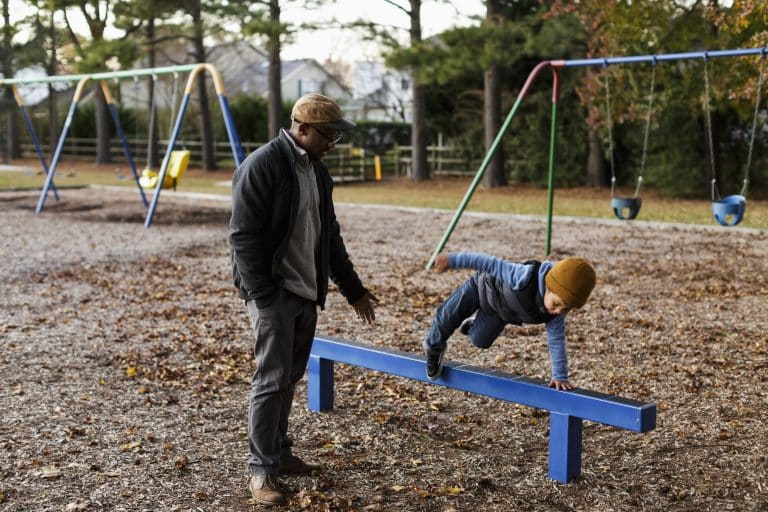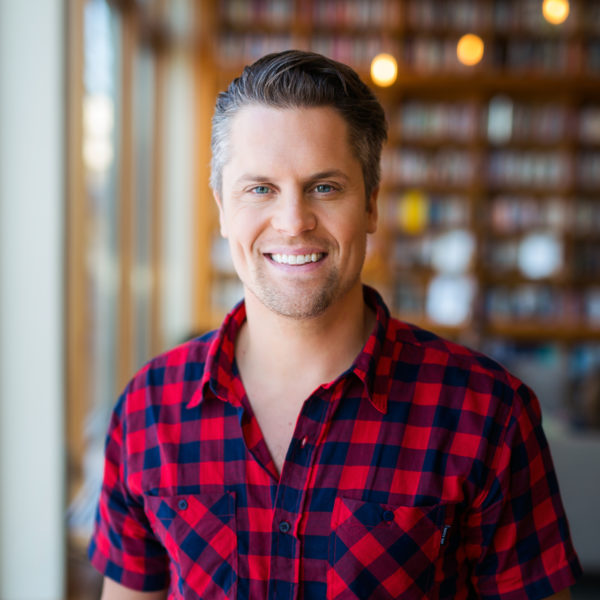
Image by Roberto Westbrook/Getty Images, © All Rights Reserved.
Being Present to Fatherhood, at the End of Fathering
My friend’s appointment was the next morning. He was ready for the most part, but wanted to have one more conversation before the procedure. So on a dark December night at a local coffee shop after hours, he convened a group of close friends to help him process the multitude of emotions he was feeling on what was almost definitely his last night — his last night of paternal productivity. In the morning, he would get a vasectomy.
Along with about ten other married men — all of us in our late thirties and early forties, and each the father of a couple children or more — I joined my friend that night to support him. And also to reflect on my own intentional transition into sterility. I had undergone a vasectomy a few months earlier, but I had not yet adequately explored what the end of my fathering potential meant.
In fact, none of us huddled around those coffee shop tables had made space for deeper, more vulnerable reflection on the significance of the decisive act. Whether we had recently undergone a vasectomy, were actively thinking about getting one, or had ruled it out entirely, we had settled for snippets of conversation, jokes, and congratulatory pats on the back. Or we skimmed over how we decided with our partners on this method of birth control, as opposed to condoms, pills, an IUD, tubal ligation, natural family planning, or some other approach. But generally we avoided wading into the deeper waters of what this meant for our identities, our marriages, and our parenting.
I imagine we’re not alone in our experience of near silence on the matter. Yes, men might cover the nearly obligatory topics when we talk about vasectomies: A horror story or two about a friend who got a massively swollen scrotum after the procedure. A jaw-dropping tale about a guy someone knows who got a vasectomy followed by the surprise a few months later that his wife was pregnant. Whether or not a vasectomy increases one’s chances of prostate cancer. And why it might be a good idea to schedule the procedure on the Wednesday before the NCAA basketball’s March Madness begins. But what about tending to the grief and hope that this transition stirs up?
Just a few days after my procedure, I held my five-year-old daughter’s still chubby hand as my wife and I walked her to her classroom for her first day of kindergarten. She was backpack-clad and beaming, thrilled to finally be joining her big sister and brother at school. Our parental feelings were more ambivalent. Sure, we would soon enjoy a celebratory brunch that would be our entree into a whole new world of midday freedom, featuring spontaneous lunch dates and working from a quiet home, but we also felt the weight of her kindergarten departure. It meant the loss of the long days but quick years of always having a tiny companion or two or three in our care. Later as we sipped mimosas and celebrated, we alternated between joyful sighs of relief and pangs of sadness, a contradictory cocktail of emotions we still feel most days.
At the cafe, as our reflections grew more raw, it was clear that the end of fathering that a vasectomy signifies often brings about the same complex anatomy of emotions. It is the end of an era of parenting.
The loss is profound. Wasn’t it just yesterday that I received a weekly pregnancy update telling me that our baby was ten weeks old, that minuscule fingernails were forming on her tiny fingers, that she was the size of a kumquat? While I’m fine with losing my expert knowledge of obscure fruits and vegetables like kumquats, swedes, and aubergines, there is a sadness in realizing that I’ll never again experience the awe precipitated by a weekly email about the growth status of the miracle baby my wife carries.
I’ll never again witness my warrior wife endure months of bodily transformation, discomfort, and pain before bravely bringing our creation into the world. (And, perhaps fortunately, I’ll never again stumble around in my attempts to support her during this magical morphing.)
I won’t get another chance to quietly unbuckle my own sleeping, sweaty-headed kid from the carseat and gently transfer him into his crib to complete his afternoon nap.
There are a host of losses tied up in this transition. Not only do we lose access to these experiences that we have been privileged to know; we also lose what we will never know.
We won’t round out our family to a family of four children, like the families we both came from. We won’t get to see our children express love and care for their own baby sister or brother in the same way they delight in our friends’ son.
We surprisingly had three children in three and a half years — so close together. It was all a blur. As we wondered about trying for one more, we often fantasized about what it would be like to have a baby and be able to give it more attention and soak up every moment. But now we won’t get to experience that.
This vasectomy is a severance from our past as well as our possible future.
I didn’t realize it then, but my friend had gathered us on the winter solstice, the darkest night of the year. In some religious traditions, it represents an invitation to grieve. Every one of us gathered that night who was done having children, whether through vasectomy or otherwise, fittingly joined in that tradition by naming some aspect of fatherly loss. Each one needed to be named.
The winter solstice can mark pain and loss, and yet it also represents a turn towards the growing light, towards hope and new possibilities. Our conversation gravitated in this direction too.
A vasectomy is typically a declaration that a couple is done having children, that a nuclear family is in some way complete. Before my procedure, my wife and I had this kind of clarity that our family was fixed at five members. But while it has meant the end of fathering in the procreative sense, it also has presented me with a new season of fathering, not anticipating future arrivals, but focused on tending to the three precious souls in our care. I get to invest fully in teaching them the critical lessons of this season of life: How to listen to their inner voice. How to be a healing presence in the world. How to put dirty dishes in the dishwasher rather than on the counter.
Marking the end of one season of fathering also serves as a wake up call to the urgency of being here now, in this moment, with my children who seem to be growing up at an exponentially faster rate. Just as I’ll never experience those precious toddler years again, this is my one chance to test out an array of accents while reading Harry Potter with my ten-year-old daughter every night, my one chance to gaze at the soaring bald eagle while enjoying my nine-year-old son’s extremely high-pitched imitation of an eagle call.
As I heard my friends open their hearts and share their own stories of what they’re trying to embrace in their respective present fatherly moments with their children, I felt carried by their courage. And I felt called. This ceremonial conversation showed me that the end of my capacity to father children is an opportunity to fully embrace what it means to father. To live, like these men, with humility, integrity, and vulnerability. And to be a curious, empowering, and compassionate presence — not only for my own children, but for my community and the world.
